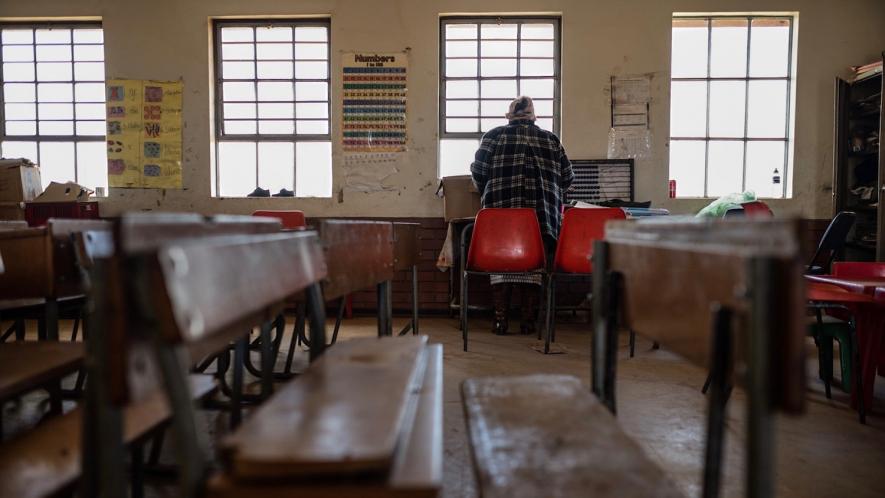Continued Resistance to School Reopening in South Africa

12 April 2018: Kwambenya Senior Primary on the outskirts of Bizana, Eastern Cape. Hundreds of schools in the province will likely not meet the minimum standards for reopening during the Covid-19 lockdown. Photo: Daylin Paul / New Frame
The 27,000 members-strong Educators Union of South Africa (EUSA) has sought Pretoria High Court’s interdict against the South African government’s decision to reopen schools starting from June 8.
On Tuesday, June 2, an urgent application filed by the union on May 29 naming Basic Education Minister Angie Motshekga as the respondent, was scheduled for its first hearing.
However, the judge postponed the matter till June 9, “stating that the department (of basic education) was not ready to proceed and that he needed more time to familiarize himself with the matter as it of a higher profile,” EUSA said in a statement yesterday.
The original plan, as announced by the education minister on May 19, was to start reopening schools from Monday, June 1. Soon after this announcement, five other education unions had released the results of a survey they had jointly commissioned, showing that preparation in most cases were yet to begin.
As the date approached, the decision was met with strong objections at the multiple meetings that were held with school governing bodies and parents over the weekend. On June 1, parents held protests outside a number of schools, while maintaining appropriate physical distance between each other.
Most schools in the country remained closed that day, except some “mainly independent schools which operate in parallel with state schools, but are largely funded by wealthier parents,” The East African reported. Most of these schools have the necessary funds to be able to take the measures to comply with the safety regulations.
However, a majority of the public schools, “particularly from the black working-class areas, are nowhere close to being compliant with the regulations. There are not sufficient Personal Protective Equipment and sanitisers,” South African Federation of Trade Unions (SAFTU) said in a statement, expressing support for EUSA’s decision to go to court.
“Social spacing in the classrooms will be difficult if not impossible given the inadequate building infrastructure,” the SAFTU statement pointed out, adding, “Indeed, thousands of schools do not have even the most rudimentary forms of hygiene, water and ablution facilities.”
Under mounting pressure, the Education Minister finally admitted on May 31 that it was “too risky” to reopen schools yet, and announced that it will be postponed by a week until June 8.
However, this “last-minute concession… is not giving us sufficient assurance that the government will have addressed the concerns of teacher organisations, parents and governing schools,” SAFTU said. The EUSA went ahead with seeking an interdict against the reopening of schools on June 8.
In the affidavit filed on June 1, the education department told the court that proper preparations are being made to reopen schools from June 8. The union, however, dismissed the affidavit as simply “plagiarism of the minister’s media statements, which are disguised as a legal response.”
The union demands evidence of the claims made by the department in the affidavit, “including reports from specialists they claim to have consulted” and “a copy of the proposal which they claim to have submitted to the Corona Virus Command Council, together with a confirmation of the decision from the Council.”
The education department also claimed in court that children rarely contract the virus, referring the judge “to an affidavit by a certain Dr. Martin Gustafsson, who is apparently an Education Economist. So now the department depends on economists to advise them about health matters,” EUSA complained.
Contrary to the education department’s claim that the schools are provided with a “School Health Team”, the union pointed out that the nurses who are supposed to make up this team are yet to be hired. “Gauteng Education (Department) had invited applications from unemployed youth to fulfill the duties enlisted here,” its statement pointed out.
It is in the light of such irregularities that the department’s submission to court was sent on “an unsigned document”, on the grounds that its “Director General was not available to sign it”, EUSA said, adding that this was “condemned harshly” by the judge.
The union further alleged that the Director General has intentionally avoided signing the document, because “he is aware that the implications are criminal.”
Get the latest reports & analysis with people's perspective on Protests, movements & deep analytical videos, discussions of the current affairs in your Telegram app. Subscribe to NewsClick's Telegram channel & get Real-Time updates on stories, as they get published on our website.
























